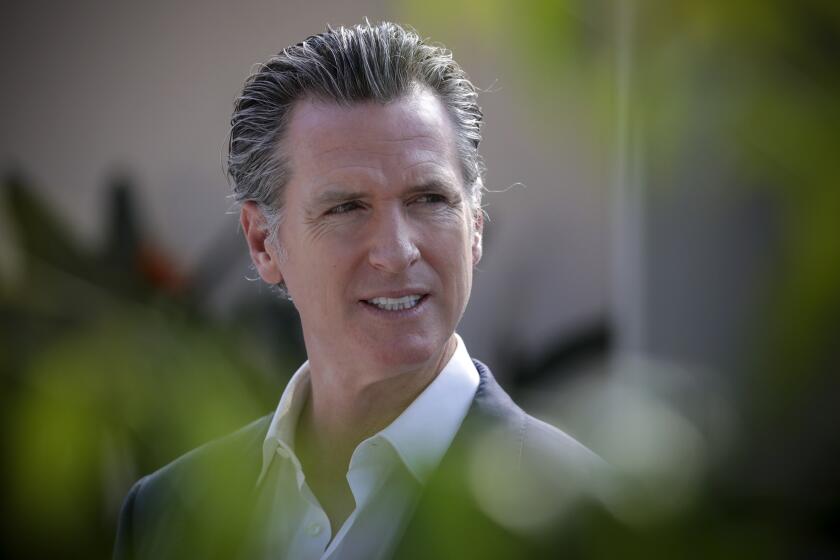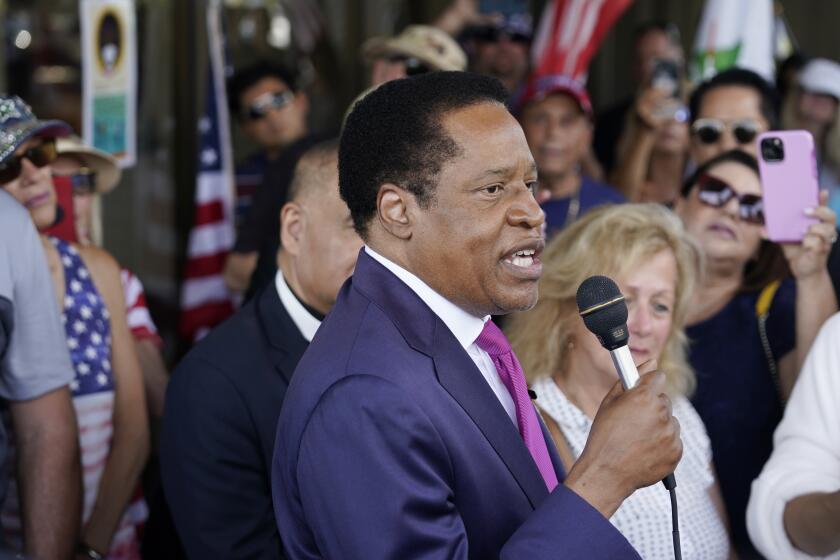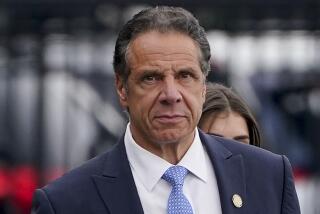New York Gov. Andrew Cuomo resigns after report finds sexual misconduct claims credible

New York Gov. Cuomo resigns amid flurry of sexual harassment allegations.
- Share via
Gov. Andrew Cuomo announced Tuesday that he was resigning from office, following a blistering report by the New York attorney general that concluded he had sexually harassed multiple women — a move that staved off likely impeachment by state legislators in Albany.
The investigation released Aug. 3 left Cuomo increasingly isolated even from his own party as top Democrats including President Biden called for him to step aside. Cuomo said his resignation would become effective in 14 days.
“The best way I can help now is if I step aside and let government get back to governing,” Cuomo said in a video announcement. “And therefore, that’s what I’ll do.”
Democratic Lt. Gov. Kathy Hochul will succeed him, becoming New York’s first female governor.
Cuomo’s downfall was a remarkable reversal of fortune for a man who is part of a political dynasty and who a year ago was considered a likely future White House contender.
Gov. Gavin Newsom and Democrats are singularly focused on Californians casting a “no” vote on the first part of the recall ballot. That may leave some voters unaware they can also choose a replacement in the event Newsom loses.
But he had become a political pariah by the time he announced Tuesday that he would not finish his third term as New York governor. Scores of Democratic elected officials had been pressuring him to vacate the office even before state Atty. Gen. Letitia James began an investigation that found credible the allegations of 11 women accusing Cuomo of sexual misconduct.
The accusers’ reports of unwanted advances from the governor, including groping, kissing and lewd comments, were detailed in the 165-page findings of the investigation. At least two accounts had not previously been disclosed publicly. One of the women was a state trooper Cuomo had assigned to his detail.
The report also found that Cuomo had retaliated against another of his accusers. It concluded that Cuomo and his staff had violated multiple state and federal laws and created a toxic and hostile workplace.
Cuomo forcefully denied the report’s conclusions and issued an 85-page rebuttal that addressed each claim of sexual misconduct.
“I want you to know directly from me that I never touched anyone inappropriately or made inappropriate sexual advances,” he said in a video released soon after James’ findings became public. “I am 63 years old. I have lived my entire adult life in public view. That is just not who I am, and that’s not who I have ever been.”
On Tuesday, Cuomo continued to insist his tactile behavior did not have any abusive intent, but he struck a more contrite tone.
“In my mind, I’ve never crossed the line with anyone,” he said, “but I didn’t realize the extent to which the line has been redrawn.”
Atty. Gen. James, who is widely seen as a potential contender for governor, said Tuesday that Cuomo’s resignation closed “a sad chapter for all of New York,” adding: “But it’s an important step toward justice.”
She thanked Cuomo for his contributions to the state and said the ascension of Hochul as chief executive would “help New York enter a new day.”
Hochul, a 62-year-old Buffalo native, has served as Cuomo’s lieutenant governor for the last seven years. Before that her career was mostly in local politics, though in 2011 she briefly served in the U.S. House after winning a special election in a district that had been considered safe for Republicans. The election drew national headlines, but the GOP took back the seat the next year.
Before Cuomo’s resignation, Hochul had been out front in condemning his behavior. She said she agreed with his decision to step down, writing on Twitter the move was “the right thing to do and in the best interest of New Yorkers.”
“As someone who has served at all levels of government and is next in the line of succession, I am prepared to lead as New York State’s 57th Governor,” she tweeted.
As harassment accusations began to surface against Cuomo over the winter, he originally backed an independent review into the claims. But he later complained that the investigation was tainted by political bias. He initially dug in against calls for him to step aside, and as recently as Tuesday morning, before the governor’s resignation, his personal attorney contested the accuracy of the review.
Cuomo’s denials did little to muffle the drumbeat of Democrats who urged him to step down in response to James’ findings, including Biden, who called on his longtime friend to resign just hours after the review was made public.
Asked on Tuesday to assess Cuomo’s tenure overall, Biden said the governor had done “a hell of a job ... on everything from access to voting to infrastructure to a whole range of things. That’s why it’s so sad.” The president clarified he was speaking about Cuomo’s job performance, not his personal behavior.
Cuomo had already lost the support of many New York Democrats, including Sens. Charles E. Schumer and Kirsten Gillibrand, who had urged the governor to step aside in the spring after several women went public with accusations. The release of the investigative report compounded Cuomo’s woes in Albany, where lawmakers had already initiated an impeachment investigation, after state Assembly Speaker Carl Heastie said the governor had “lost the confidence of the Assembly Democratic majority and ... can no longer remain in office.”
Cuomo’s hopes of outlasting the scandal dimmed further as he continued to lose key allies, including the state Democratic Party chair and major labor unions. Melissa DeRosa, who the report said had led efforts to retaliate against one of Cuomo’s accusers, quit Monday as his top aide.
A Quinnipiac University poll released last week found that 7 in 10 New Yorkers, including 57% of Democrats, wanted the governor to step down. Impeachment proceedings in the statehouse accelerated, and prosecutors in three New York counties initiated investigations into potential criminal violations.
New York officials across the political spectrum described Cuomo’s decision to step aside as necessary.
Senate Majority Leader Schumer thanked “the brave women who stepped forward and courageously told their stories,” and voiced his confidence in Hochul.
Rep. Elise Stefanik, who represents part of upstate New York as the third-ranking Republican in the U.S. House, said Cuomo’s resignation was “long past overdue” and called for the governor “to be arrested and prosecuted for sexual harassment, sexual assault, and sexual abuse.”
It’s a stunning collapse for Cuomo, son of the late Gov. Mario Cuomo, who was serving his third term as governor of New York.
A year ago, when the pandemic broke out, the younger Cuomo helped fill the void created by the lack of leadership from the Trump White House. New York was hard hit by COVID-19, but Cuomo’s daily briefings that mixed pandemic data, pleas to New Yorkers to take precautions and snapshots of his personal life became must-see-TV for viewers across the country. His popularity drove some Democrats to hope Biden would pick Cuomo as his running mate.
Larry Elder leapfrogs the others vying to replace Newsom, with provocative stances from firing teachers to downplaying the dangers of secondhand smoke.
Cuomo had already had a productive tenure in the governor’s office, helping to bring fiscal discipline to the state, to push through the legalization of gay marriage and to impose a fracking ban.
But in January, James found that the state had undercounted the number of deaths in nursing homes by thousands since the pandemic had started. Cuomo ultimately released new data, saying he had been trying to avoid a biased inquiry by the Trump administration. But his critics also pointed to his decision in spring 2020 to force nursing homes to accept people who had the coronavirus.
Cuomo is also facing allegations that he, his family and powerful backers received special access to virus testing.
The nursing home controversy touched off Cuomo’s rapid descent, which initially echoed a pattern familiar to other governors who rose to prominence and soaring popularity amid a crisis. Former GOP Gov. Chris Christie, for example, had seemed politically invincible after steering New Jersey through the devastation of 2012’s Hurricane Sandy. But voters turned on the Republican amid a bruising state government shutdown in 2017, when Christie was photographed relaxing with his family on a beach after he had ordered that all state beaches remain closed to the public.
And the sky-high approval ratings that California Gov. Gavin Newsom enjoyed in the early days of the pandemic were supplanted with widespread public disappointment in the Democrat’s job performance as the state botched the distribution of unemployment checks and struggled with the vaccine rollout. Now, he faces a September recall vote.
But Cuomo’s problems would quickly dwarf those of the other governors, as accusations surfaced about outrageous and potentially criminal conduct.
Along with the misconduct allegations came reports of a toxic work environment in his office, in which colleagues were pitted against one another, cursing and yelling were the norm, and young, thin, blond women who wore tight dresses and high heels were routinely hired.
But even before the recent salacious allegations, Cuomo’s tenure was far from blemish-free. He was known as a bully who ruled through intimidation. And he’d survived controversies — notably, ethics investigations that resulted in allies going to prison.
But in the #MeToo era and with few allies willing to stay by his side after years of his heavy-handed rule, Cuomo was no longer able to save himself.
Times staff writer Chris Megerian in Washington contributed to this report.
More to Read
Get the L.A. Times Politics newsletter
Deeply reported insights into legislation, politics and policy from Sacramento, Washington and beyond. In your inbox twice per week.
You may occasionally receive promotional content from the Los Angeles Times.















